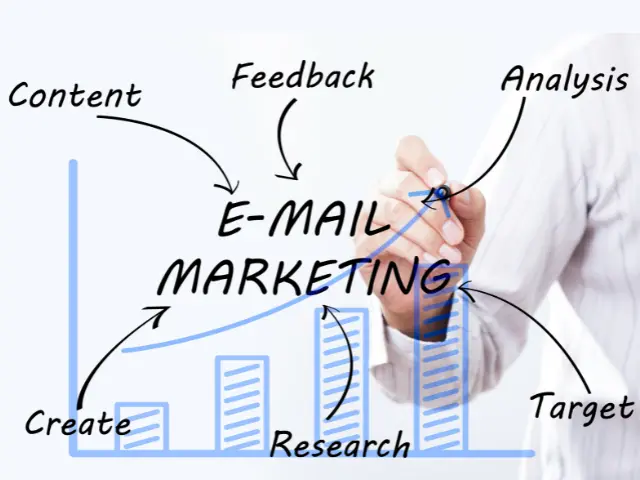What is Email Marketing?
Email marketing is a digital marketing strategy which includes sending promotional content to a group of individuals via email. It is a highly effective and versatile marketing tool that allows businesses to communicate directly with their audience, nurture leads, build customer relationships, and drive conversions. Here’s an overview of email marketing:
1. Building an Email List:
The first step in email marketing is to build a permission-based email list of individuals who have opted in to receive communication from your business. This can be done through sign-up forms on websites, landing pages, social media, or in-store interactions.
2. Segmentation and Targeting:
Once you have an email list, segmenting it based on specific criteria (such as demographics, purchase history, or engagement level) allows you to send more targeted and appropriate content to various segments of your audience. This will make your campaign more effective.
3. Creating Compelling Content:
The content of your email is crucial. It should be engaging, personalized, and provide value to the recipient. Common types of email content include newsletters, product updates, promotional offers, educational content, event invitations, and customer testimonials.
4. Designing Eye-Catching Templates:
Using visually appealing email templates that are consistent with your brand identity can enhance the impact of your messages. Templates should be mobile-responsive, as a significant portion of email is now accessed on mobile devices.
5. Automation and Personalization:
Email marketing platforms offer automation features, allowing you to set up automated email sequences triggered by specific actions or events. Personalization techniques such as dynamically inserting the recipient’s name or customizing content based on their preferences can improve engagement and response rates.
6. Deliverability and Compliance:
Ensuring that your emails reach the recipients’ inboxes is critical. Following email deliverability best practices, such as using authenticated sending domains, maintaining a clean email list, and complying with anti-spam regulations (such as including an unsubscribe link), helps maintain a good sender reputation and maximize deliverability.
7. Analyzing and Optimizing Campaigns:
Email marketing platforms provide analytics and tracking features to measure the performance of your email campaigns. Metrics such as open rates, click-through rates, conversion rates, and unsubscribe rates can help you evaluate the effectiveness of your campaigns and make data-driven improvements.
Role of Email Marketing within your business strategy

Email marketing plays a crucial role within a comprehensive marketing strategy. It serves as a powerful tool for businesses to engage with their audience, nurture leads, drive conversions, and build customer relationships. Here are some key roles that email marketing fulfills within a marketing strategy:
1. Lead Generation and Nurturing:
Email marketing helps businesses capture leads by encouraging website visitors, social media followers, or customers to subscribe to their email list. Once subscribed, businesses can nurture leads through targeted email campaigns, delivering valuable content and personalized offers to move them through the sales funnel.
2. Relationship Building and Customer Engagement:
Email marketing enables businesses to build and maintain relationships with their audience. By sending regular newsletters, updates, or exclusive content, businesses can stay top-of-mind with subscribers, provide value, and foster engagement. This helps establish trust, brand loyalty, and long-term customer relationships.
3. Driving Conversions and Sales:
Email marketing is an effective channel for driving conversions and sales. By sending promotional emails, special offers, or abandoned cart reminders, businesses can encourage recipients to take action and make purchases. Well-crafted email campaigns can leverage persuasive copy, compelling visuals, and clear calls-to-action to drive conversions and increase revenue.
4. Personalization and Targeting:
Email marketing allows businesses to personalize their messages and offers based on subscriber data and segmentation. By segmenting the email list based on demographics, interests, purchase history, or engagement level, businesses can tailor content to specific groups, increasing relevance and engagement.
5. Automation and Workflow Efficiency:
Email marketing platforms offer automation capabilities, allowing businesses to set up automated email sequences triggered by specific events or actions. This automation streamlines workflows, saves time, and ensures timely communication with subscribers. Automated sequences can include welcome emails, onboarding sequences, follow-ups, or re-engagement campaigns.
6. Feedback and Market Research:
Email marketing can be used to gather feedback and conduct market research. By sending surveys or requesting feedback from subscribers, businesses can gather valuable insights about their products, services, or customer experience. This data can inform marketing strategies, product development, and customer retention efforts.
7. Analytics and Optimization:
Email marketing platforms provide analytics and tracking tools to measure the performance of email campaigns. Businesses can track metrics such as open rates, click-through rates, conversions, and unsubscribe rates. Analyzing this data helps identify what works and what needs improvement, allowing for continuous optimization of email campaigns for better results.
Conclusion
In summary, email marketing plays a vital role within a marketing strategy by generating and nurturing leads, building relationships, driving conversions, and providing valuable insights.
It is a versatile and cost-effective channel that allows businesses to directly engage with their audience, deliver targeted content, and achieve marketing objectives. When integrated with other marketing channels, email marketing enhances the overall effectiveness and success of a marketing strategy.
Ready to get started learning E-Mail Mareting? Register for a free demo
Get more details regarding Powerpoint
Phone no.
9988-500-936
Address
SCF 22, First floor, GTB Market, Khanna
Website
www.microwavecomputer.com
Opening Hours
08:30 am - 06:00 pm
- Best Dropshipping Course in Khanna
- Digital Marketing Course in Khanna – Learn Job-Ready Skills at Micro Wave Computer Institute
- Dropshipping Course in Khanna – Build a Profitable Online Business with Micro Wave Computer Institute
- Basic Computer Course in Khanna – Learn Essential Computer Skills for Career Growth
- Graphic Designing Course in Khanna – Start Your Creative Career with Microwave Computer Institute
